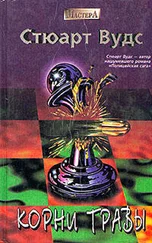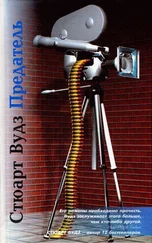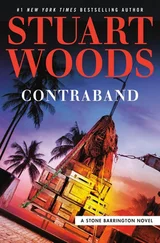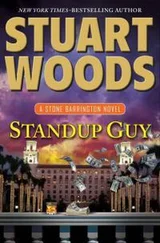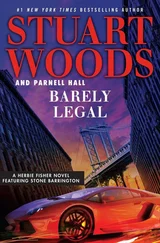She took him into an equipment room and supplied him with a thick canvas jumpsuit and a protective upper-body garment that, when zipped up, gave him a shield from his chin to his crotch, and the sleeves of which stopped below his knuckle. “Suit up. You can put your things in a locker, there. I’ll be waiting through that door.” She pointed.
Fife-Simpson liked the garment he was donning; he thought it might soothe the fears of some of his students at Station Two. He opened the door and stepped into a room of about twelve by eighteen feet, with a thickly padded floor and walls, up to about six feet. Meg was sitting on a bench at his right, and she stood up and beckoned him to a cabinet, opening the doors to reveal a couple dozen knives and other hand weapons.
“Please select something,” she said.
Fife-Simpson chose an ordinary-looking, but very sharp, field knife. “This, I should think,” he said.
“Good,” Meg replied. “Now, may I introduce you to Mr. Wu?”
Fife-Simpson turned and found an Asian man standing in the center of the room, dressed in gym shorts and nothing else. He appeared to be unarmed, and the brigadier had not heard him enter. The man beckoned, then pointed at a spot on the padded floor, about six feet in front of him.
Fife-Simpson walked out onto the floor and stopped.
Wu stood, feet slightly apart, empty hands at his sides. He had thick, cropped black hair and bland features. He beckoned with both hands. “Attack me, please,” he said.
Fife-Simpson shook his head and said, “You are unarmed. I have you at a disadvantage.”
“Perhaps not,” Wu replied. “Attack me, please,” he repeated.
Fife-Simpson felt a trickle of fear run down his bowels, but he shook it off, assumed a fighting stance, and circled to his left.
Wu turned with him, but made no other movement.
Fife-Simpson feinted a couple of times, but Wu had no reaction. Oh, what the hell, Fife-Simpson thought to himself, and lunged at the man’s face. He was very quick, but Wu was quicker. He caught the brigadier’s wrist, and Fife-Simpson found himself on his belly, his own knife blade pressed against his throat. What the hell was that? he asked himself.
Wu took the knife away and stood up, beckoning Fife-Simpson to do the same. He tossed the knife to the brigadier, who caught it blade first, cutting his finger.
“Again,” Wu said, beckoning.
Fife-Simpson was angry and embarrassed now and did not hold back. He feinted, and tossed the knife from one hand to the other, a maneuver that usually worried his opponents.
Wu simply caught the knife in midair and tossed it back to his attacker, who was struck in the chest by the blade.
Fife-Simpson was grateful for the protective gear now, because without it he would have had a knife blade in his heart. Wu was still beckoning with both hands.
The brigadier recovered the knife and, with no hesitation, flung himself feet first into a leg tackle, bringing Wu to his knees, but no further. There was the flash of a hand and Fife-Simspon found himself flat on his back, with the knife blade laid against his cheek, the tip a quarter-inch from his eye.
Wu looked at Meg questioningly. She gave him a slight nod.
Fife-Simpson was yanked to his feet, and the knife was tossed to him again.
“Once more,” Wu said softly.
Fife-Simpson was humiliated and furious now. He drew himself into a coil — his left arm before him, bent at the elbow, fist clenched — and flung himself at Wu, slashing back and forth, a maneuver designed to hit his opponent anywhere, and with enough force to mark his body and bring blood.
Fife-Simpson found himself flying through the air. He struck the padded wall with more force than he had expended, then collapsed in a heap. He felt a warm trickle down one side of his nose, which found his lips and tasted a little salty.
“Enough!” Meg called out.
Fife-Simpson staggered to his feet, blinded in one eye by blood.
“Over here,” Meg said.
Fife-Simpson staggered across the matted floor to where she stood. A young man stood beside her, holding what appeared to be a fishing tackle case.
She stripped the protective clothing off him. “Lie down on the bench, face up,” Meg said.
Fife-Simpson followed her every instruction instantly, and the young man spent several minutes suturing and then bandaging his forehead and finger.
A half hour later, Fife-Simpson was driving his car through the gate of Camp Peary and onto the public road, following instructions to the motorway back to Washington, wondering what the hell had happened to him, and why.
Over breakfast the next morning, Lance told Stone and Rose about Fife-Simpson’s experience at the CIA and Camp Peary.
“Was he badly hurt?” Rose asked.
“His injuries were almost entirely to his ego,” Lance replied. “I thought a little humility might help him in his instruction of trainees at Station Two.”
“I was one of them,” Stone said, “and I hope you’re right.”
“Who is this Wu fellow?” Rose asked.
“Probably the best street fighter in the world,” Lance replied, “with or without weapons. I once temporarily gave that title to another of our instructors, but Wu brought a quick end to his supremacy.”
“Where did you find him?”
“In the Army, where we find a lot of our operational people,” Lance said. “During basic training he was housed in a barrack full of racist recruits who challenged him to fights. He worked his way through them in a matter of days. His drill sergeant, who was afraid of him, called an intelligence officer to the base. After an interview, we whisked him away to Camp Peary, and we’ve never let him go.”
“So, Fife-Simpson is not the fighter he tells everybody he is?” Stone asked.
“No, but he is hardly helpless,” Lance said. “He is probably the equal of our average instructor at Camp Peary, and if you should ever be provoked into a fight with him, my advice would be to shoot him in the head immediately.”
“I think I’ll start by asking Felicity not to bring him to dinner again,” Stone said.
Felicity was halfway through her morning at work when her secretary announced Brigadier Fife-Simpson.
“Ah, Roger, back from your travels? Is that a bandage on your forehead?” She waved him to a chair.
“Nothing serious,” he said, “though it could have been.”
“Could this be the result of an encounter with a person called Wu?” she asked.
“It was,” he replied, “and I am not grateful to you for putting me in that position. I could have been badly hurt.”
“Roger,” she said reprovingly, “it is my information that you were armed with a knife, while Wu had only his bare hands to defend himself. And it is my recollection that, when training recruits at Station Two, you gave them actual knives for them to practice killing each other.”
“I did that for their own good,” he said primly.
“Then perhaps the people at Camp Peary thought you needed an attitude adjustment,” she replied.
“I, indeed?” He sniffed. “I was trundled about their headquarters like a foreign tourist, then sent down to their training establishment and humiliated.”
“Well, you were a foreign tourist, but I suppose I must apologize for them,” Felicity said, mock-soothingly.
“I think you and Lance Cabot hatched this plot between you,” he said. “I just want you to know it didn’t work.”
“May I remind you,” Felicity said, “that I am your superior at this service?”
“And I am a brigadier general of the Royal Marines,” he nearly shouted.
“Perhaps you are not aware,” Felicity said coldly, “that my position here carries the military rank of full admiral?”
Читать дальше




